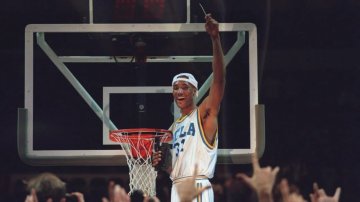From UCLA Star to Legal Trailblazer: Ed O’Bannon’s Basketball Journey and Landmark Fight for College Athlete Compensation
Written By: Robert Littal Ed O’Bannon enjoyed an impactful basketball career, shining as a national standout during his college years at UCLA

exc-672ab18b0849b20a32872fa6
Written By: Robert Littal
Ed O’Bannon enjoyed an impactful basketball career, shining as a national standout during his college years at UCLA. After suffering a severe knee injury in high school, O’Bannon had a significant rebound and joined UCLA, where he played from 1991 to 1995. His peak came during his senior season when he led the Bruins to a national championship in 1995. He was named the NCAA Tournament’s Most Outstanding Player, averaging 30 points and 17 rebounds in the final against Arkansas, cementing his place in UCLA basketball history.
O’Bannon was selected by the New Jersey Nets as the 9th overall pick in the 1995 NBA Draft. However, his NBA career was short-lived. Unfortunately, he struggled to find his footing in the league, playing only two seasons (with the Nets and briefly with the Dallas Mavericks) before moving overseas.
He played in international leagues in countries like Spain, Greece, and Argentina, where he found more success before eventually retiring in the early 2000s.
Although his professional career was modest compared to his college success, O’Bannon’s legacy in basketball grew due to his involvement in O’Bannon v. NCAA, the landmark case that reshaped college sports compensation. This impact extended his influence far beyond his playing years.
The Ed O’Bannon lawsuit, formally known as O’Bannon v. NCAA, was a landmark legal case that challenged the NCAA’s use of college athletes’ names, images, and likenesses (NIL) without compensation. Here’s a breakdown of the case:
Background and Filing of the Lawsuit (2009)
-
Ed O’Bannon, a former UCLA basketball player, filed the lawsuit in 2009 after noticing his likeness used in an NCAA video game. He argued that former and current college athletes should receive compensation for using their NIL, as the NCAA profited from licensing deals that included video games, merchandise, and broadcasts.
-
O’Bannon filed the case as a class-action suit, representing himself and other NCAA athletes. He challenged NCAA rules that prevented athletes from sharing in revenues earned through their identities.
The Legal Arguments
-
For O’Bannon and Athletes: The plaintiffs argued that the NCAA’s use of NIL rights without compensation violated antitrust laws by artificially limiting players’ ability to earn income despite the NCAA and associated parties profiting significantly. O’Bannon and his lawyers contended this constituted an illegal restraint on trade under the Sherman Antitrust Act.
-
For the NCAA: The NCAA defended its amateurism model, arguing that paying players would alter the nature of college sports and detract from their academic focus. They argued that amateurism was essential for maintaining the distinctiveness of college athletics.
District Court Ruling (2014)
-
Judge Claudia Wilken of the U.S. District Court ruled in favor of O’Bannon in 2014, concluding that the NCAA’s prohibition on compensation violated antitrust laws. The court required the NCAA to allow schools to offer up to $5,000 per year in compensation, held in trust until after players left school. The decision also allowed schools to provide scholarships covering the total cost of attendance rather than just tuition, room, and board.
Impact and Aftermath
-
Although it did not fully open the door for direct payments, the O’Bannon case set a critical precedent. It was among the first rulings to challenge NCAA policies and established that the NCAA’s amateurism rules could be subject to antitrust scrutiny.
-
This case paved the way for further challenges to NCAA policies, ultimately leading to the NCAA’s 2021 rule change, which allowed athletes to profit from their NIL rights, a major shift in college athletics.
Significance
The O’Bannon case was pivotal in redefining the concept of amateurism in college sports. It demonstrated that the NCAA could not unilaterally restrict athletes from profiting off their NIL, influencing subsequent cases and policy changes and allowing college athletes across the United States to earn compensation through endorsements, social media, and more.
Ed O’Bannon is currently working as a probation officer in Las Vegas.




